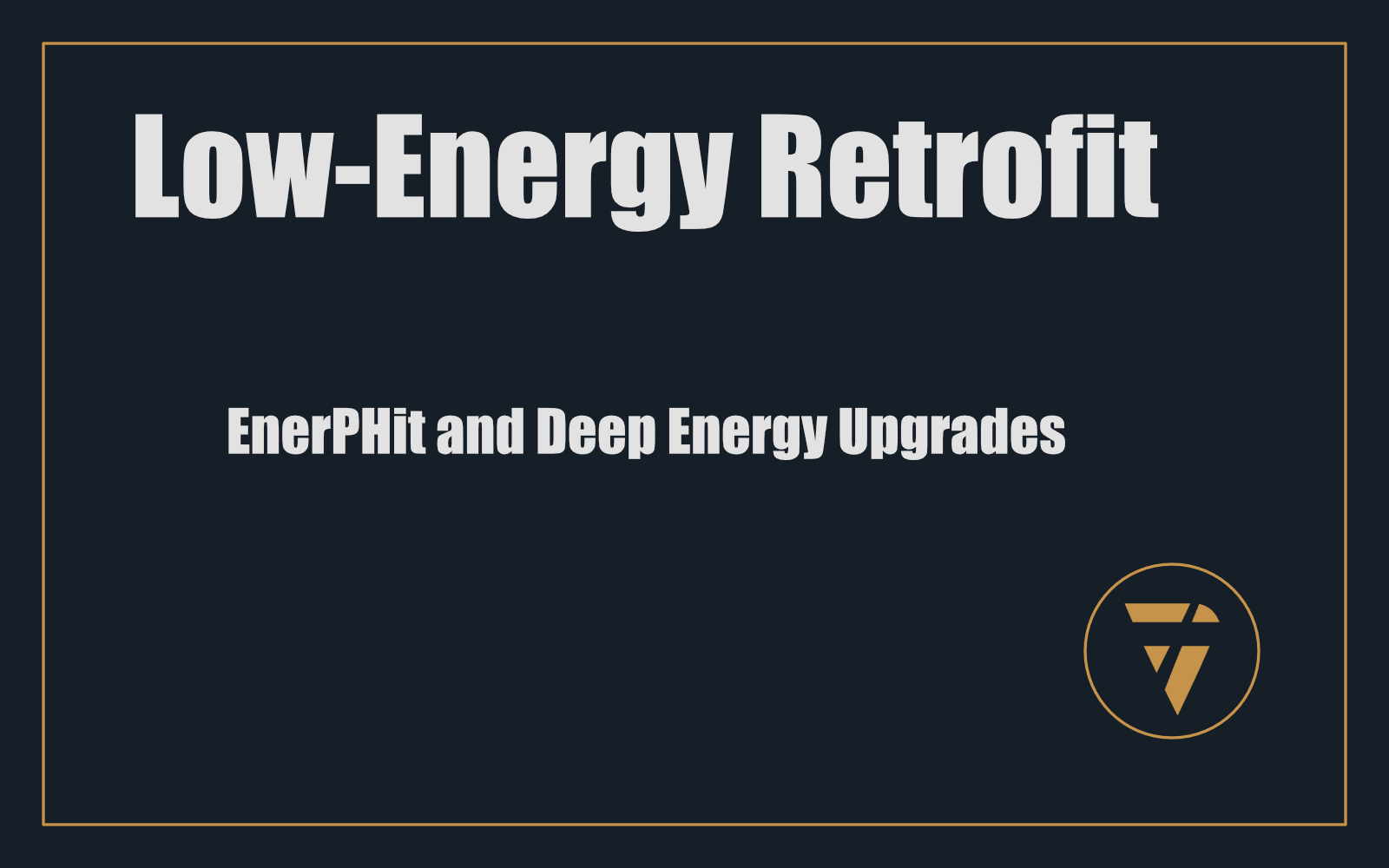Low-Energy Retrofit

EnerPHit and Deep Energy Upgrades
Canada’s building future isn’t just about what we construct—it’s about what already stands.
Houses from the 1950s, towers from the 1970s, offices from the 90s. Drafty, inefficient, fragile structures that bleed heat in winter and suffocate in summer. By 2050, the majority of buildings Canadians will live and work in are already here today.
You can’t demolish them all. But you can transform them. That’s where EnerPHit comes in.
Situation: Most Buildings Already Exist
Every Canadian city carries the same burden: an ageing building stock. The CMHC estimates that over 70% of the buildings that will exist in 2050 have already been built.
They were built to outdated codes, designed for cheap fuel, and constructed without concern for airtightness, insulation, or energy demand.
If Canada is serious about decarbonisation, resilience, and affordability, we cannot focus only on new construction. We must retrofit—deeply, strategically, and permanently.
Problem: Demolition Isn’t an Option
Demolishing entire neighbourhoods to rebuild at Passive House standard is neither practical nor sustainable. The embodied carbon in demolition and reconstruction is staggering. The social costs—displacement, disruption, erasure—are unacceptable.
But shallow retrofits—swapping a furnace, adding a little insulation—are not enough. They lock in mediocrity. The building still wastes energy, still suffers from drafts, condensation, and poor air quality.
We need a retrofit pathway that delivers Passive House performance without starting from scratch.
Solution: EnerPHit and Deep Energy Retrofits
The Passive House Institute developed EnerPHit—a certification standard for retrofits. It recognises the constraints of existing buildings while holding performance high.
The Principles of EnerPHit:
- Super-Insulation: Add insulation to walls, roof, and foundation where possible. Wrap the building in a new thermal layer.
- Airtightness: Seal leaks at junctions, replace windows and doors, and ensure the envelope is continuous.
- High-Performance Windows: Replace weak points with triple-glazed, thermally broken units.
- Thermal-Bridge-Free Detailing: Where structural constraints exist, mitigate bridges with insulation and careful design.
- Ventilation with Heat Recovery: Install HRVs/ERVs to deliver fresh, filtered, tempered air.
EnerPHit doesn’t demand perfection—it sets realistic but ambitious thresholds that recognise existing conditions.
Performance Metrics:
- Space heating demand ≤ 25 kWh/m² per year (versus 15 for new Passive Houses).
- Airtightness ≤ 1.0 ACH50 (versus 0.6 for new builds).
Still a dramatic leap compared to conventional retrofits.
How Deep Energy Retrofits Work
Deep energy retrofits often involve:
- Exterior Insulation & Cladding Systems (EICs): Wrapping entire facades with new insulation and cladding. ROCKWOOL and other suppliers now offer solutions designed for retrofits.
- Window Replacements: Installing high-performance windows in existing openings, or enlarging them for better daylight.
- Roof & Foundation Upgrades: Adding insulation above roofs, excavating around foundations to add thermal protection.
- Ventilation Systems: Retrofitting HRVs into existing ductwork or decentralised units for multi-unit housing.
The method depends on the building, but the outcome is consistent: massive reductions in energy demand, dramatic improvements in comfort, and elimination of drafts, condensation, and mould.
Consequence: Nothing Discarded—Everything Upgraded
EnerPHit gives Canada the retrofit pathway it needs. Instead of demolition, we upgrade. Instead of shallow gestures, we go deep.
- Homeowners gain comfort, health, and radically lower bills.
- Developers unlock new value in old properties without demolishing.
- Cities reduce operational emissions without mass displacement.
- Canada takes a building stock designed for cheap fuel and transforms it into one resilient against climate extremes.
This is the lever: EnerPHit proves you don’t need to start over to achieve Passive House performance. You just need to commit to upgrading everything.
Why It Matters
Every drafty home left un-retrofitted is a liability. Every leaky tower block left untouched is an energy debt. Every school with mould and poor ventilation is a health risk.
Shallow fixes delay. Deep retrofits solve. EnerPHit is clarity. It's the standard that takes what we have, and transforms it into what we need.
Here’s your lever: Canada cannot meet climate goals, cannot lower energy bills, and cannot build resilience unless we tackle existing buildings. EnerPHit gives us the tool. The question isn’t can we retrofit deeply? The question is will we?
This is what I’m working on. Tell me what you think, I enjoy the conversation! Subscribe and follow the work in real time.
Thanks!
B

Canada’s buildings already exist.
You can’t demolish them all.
But you can transform them.
EnerPHit takes fragile shells—
and makes them resilient.
Retrofit is the battlefield.
PS -






